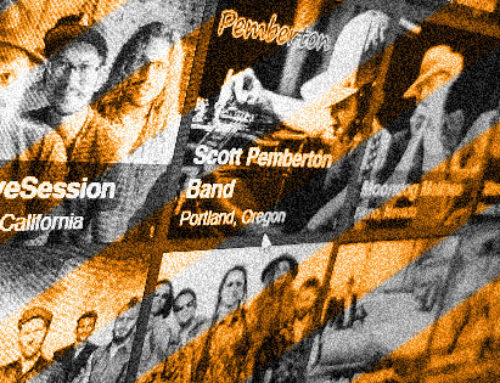OK, you’ve got great songs, a great look, and maybe even some great recordings. Where are the raving fans? If you’re going to make it big in the music business, you’ve got to play live, and that means you’ve got to get gigs. Gigging is the single best way to get your music heard and to build a fan base. But how do you book gigs? Surprisingly, it’s pretty easy.
HOW TO GET GIGS FOR YOUR BAND
MAKE A DEMO TAPE
A demo is instrumental in getting you gigs. These days, a demo “tape” is usually a CD, and it’s sometimes just a website with your songs on it. How many songs you include really depends on how many you have: you could have a whole album’s worth or as few as three or four. Since a demo generally isn’t for sale, you can feel free to include covers as well as original material. While a well-recorded demo is better than a poorly-recorded one, a demo doesn’t have to be “radio-ready.” In fact, the recording quality can be pretty rough as long as the quality of your songwriting and musicianship isn’t, and as long as the demo gives the listener a good idea of what you play and how well you play it. You can record demos on a home studio, your PC, a digital recorder, or even a tape recorder. Make sure the vocals are clearly audible in the music as well. This could mean setting the vocals up a few extra notches that you normally wouldn’t. Anyone listening to your music (especially if you plan on passing the music on to label execs) will want to hear what is being said in your song.
LABEL YOUR DEMO
Venue managers and booking agents usually receive a lot of demos, and it’s easy to get them all mixed up. Even if someone likes your demo, they won’t be able to book you if they can’t figure out who you are, so be sure to write or print your band’s name and contact information directly on the CD, as well as on the case or sleeve.
MAKE A PRESS KIT
At its simplest, a press kit may just be a single sheet of paper; a more lavish press kit may be a small booklet. The Best option is probably having a complete Electronic Press Kit online. Your press kit will depend on your budget and how much you really have to say about your band. At the very least, a press kit should include your contact information and a brief biography which tells a little bit about the kind of music you play, your influences, and your experience, Pictures of the band. You should also usually include a typical set list, including originals and covers. Think of it as a resume. The venue or booking agent will want to know, quickly, what you do and where you’ve played before. Good pictures, if you have them, are also a nice touch, and more expensive press kits may include full-color 8X10 photos. If you have positive press clippings, definitely include them, but if not, don’t worry about it. If you need help building a Professional Electronic Press Kit, Tunetrax’s Music Marketer is the best way to go.
SEND OUT YOU DEMO AND PRESS KIT TO POTENTIAL VENUES
Bars, pubs, clubs, coffeehouses, libraries, farmers markets, fairs, festivals, house parties… No matter where you live, there are probably plenty of places to play in your town or neighborhood. If you’ve never gigged before, start there. Look online for potential venues. Many will show their booking policy or at least tell you how to submit your demo. Visit venues or call them and talk to the manager (or even the bartender) and ask if you can leave your demo with them. Send your demo and press kit to as many potential venues as possible
- You can send your demo out everywhere, but it can get pretty expensive, and you may find that a lot of places just won’t book your kind of music. To see if a particular venue would be a good fit for you, look in your local newspaper or entertainment paper and see what venues are booking bands or artists that play the same kind of music you do (these papers and their online counterparts are also good places to find venues that are searching for performers), or just go to the venue and see for yourself. Whenever you see posters advertising a band that plays a style similar to yours, contact the venue where that band is playing.
- You might want to send your demo and press kit to some booking agents. These agents–the good ones, at least–have lots of contacts in the music business and can book shows for you. In return, they get a percentage of your band’s fee or they work out some other payment arrangement with you. Having an agent can open a lot of doors for you without the hassle of booking your own gigs, but it can be expensive, and some agents are better than others, so make sure you know what you’re getting into.
- Another option involving the Internet would be to make a Tunetrax page or to use a web service to house your one-sheet. These are great ways to showcase your band.
NETWORK
You may have heard the saying, “It’s not what you know; it’s whom you know.” Nowhere is this truer than in the entertainment business. The more contacts you have at venues and in bands, the more gigs you’re likely to get. Go to shows often, and play at open mics. Make friends with other musicians, and express your interest in playing gigs. Musicians will be able to give you tips on how to get gigs; they’ll be able to introduce you to agents or venue managers; and they may even ask you to play a show with them. A great way to get a gig when you’re starting out is to ask a more established artist or band if you can open for them, especially if you’ll do it for free. This makes their job easier, and helps you reach a larger audience.
BOOK YOURSELF
Having trouble getting a gig? Put on your own show. You can rent a venue or, better yet, secure one for free and plan your own show. Typically to make a self-made gig like this work, you should invite other bands–the more the merrier. This way, you can be assured a reasonably good turnout. While putting on your own show can be a great option, it can also be expensive, especially if you have to rent a venue. Watch your costs and make sure it’s worth it. Another option if you are in your teens or early twenties and willing to play for free is to play at a local teen center. These are great for beginning musicians, and often also host open mic nights.
PROMOTE YOUR GIG
Once you get a gig, you want to make sure people show up. Don’t depend entirely on the venue to advertise for you. Put up posters, notify your fans, update your website–do whatever it takes to let people know about the concert. If people see that you can bring a crowd you’re more likely to get asked back to play again, and you’re more likely to get other gigs.
PUT ON A GOOD SHOW
Nothing will get you more gigs than taking each gig seriously and putting on great shows.
- Be prepared. Of course you’ll want to have your music down so you can play like a pro, but you’ll also want to make sure you’re ready for each gig. Find out as much as possible about the venue: how large the space is, what kind of sound system and equipment they have, whether they have a sound person, etc. This way you’ll know if you need to bring your own mics or amps, for example, and you’ll have a good idea of what to expect.
- Be professional. Musicians have a reputation for being flaky, but you can’t afford to be unprofessional until you’ve made it big (and even then, it could get you in trouble). Always show up for a gig, and show up on time. Answer phone calls and emails promptly. Be responsive to the concerns of the people who book you.
- Have your demo and press kit available at every gig you play. If you rocked the house, someone in the audience might want to book you at their venue next. Be ready to give them a demo and press kit or at least a business card.
EXPAND YOUR MARKET
Once you’ve gotten established locally, take the show on the road. Try to hook up a tour with another band–preferably a more established one–or just seek out venues a little bit further away from home. Once you build a regional following, you’re well on your way to a record contract.
GET ONLINE
Put your music on online networking websites. Make sure you create a good networking/friendship base that would make you look popular by ranking and listening to your music.
- While the Internet may not seem like a fast way to land a local gig – if you contact music weblogs specializing in the type of music your band produces, you may find the right kind of support. If you are an unusual or new sounding act, try indie blogs first. Sometimes a regional blog or the entertainment page of a city blog will get you published. These pages have built-in fans who are looking for new material. Some of the readers have connections.



